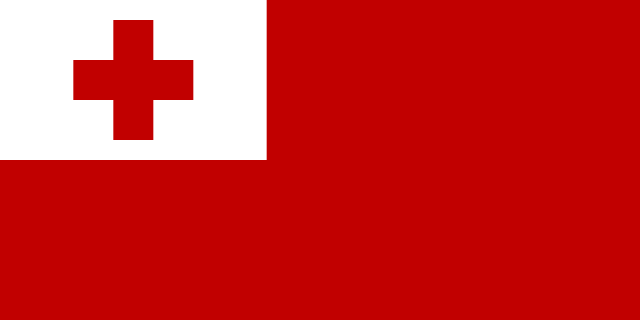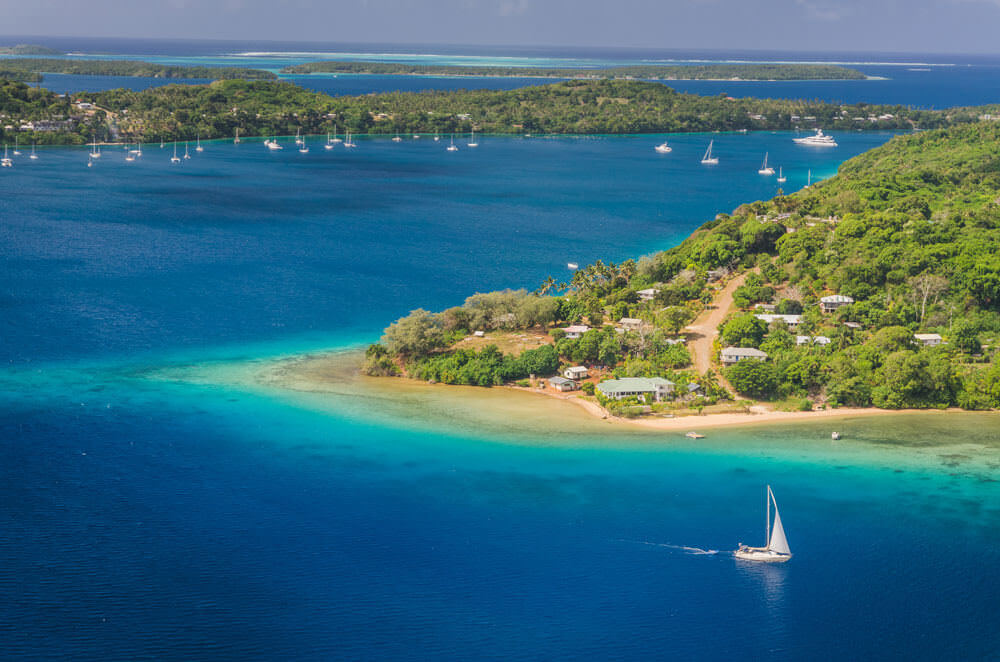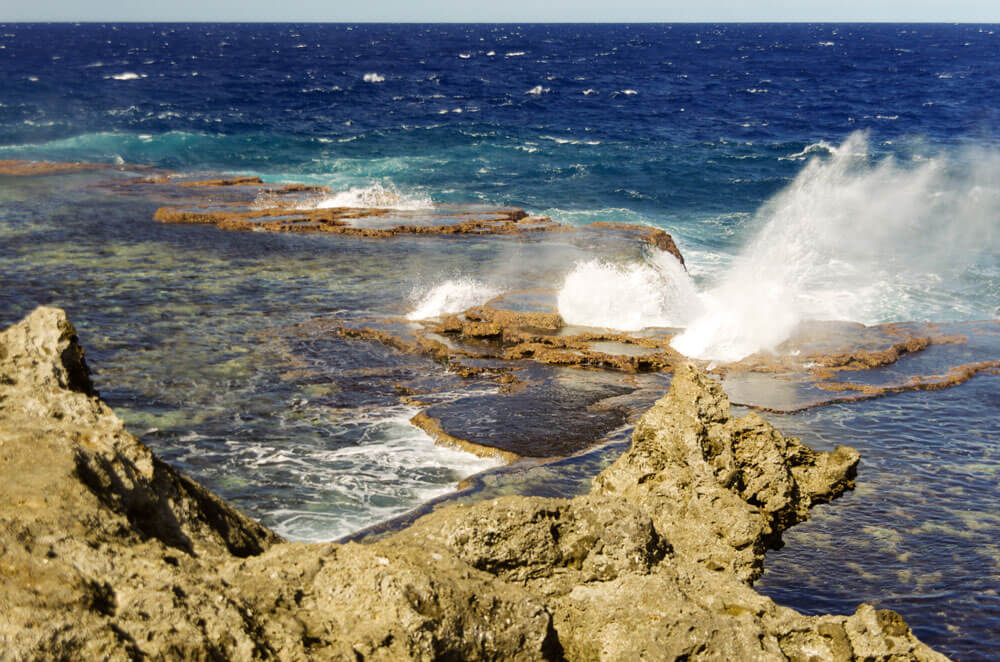Tonga

Capital city: Nukuʿalofa
Population: 106,760 (2021 est.)
Land area: 748 km²
Official languages: English, Tongan
Legal system: Teutonic civil law, Roman law
Time zone: GMT+13
Currency: Tongan paʻanga (TOP)
GDP: 0.50 USD Billion (2021 est.)
Main industries: Fisheries, agriculture, manufacturing, tourism
Principal exports: Fish, agricultural produce
The Kingdom of Tonga, formerly known as the Friendly Islands, is an archipelago of around 170 islands in the South Pacific Ocean. The nation of Tonga is divided into three groups of islands – Tongatapu in the South, Ha’apai in the centre and Vava’u in the north. Aside from these main island clusters, outlying islands include the Niuas island group (includes Niuafo’ou, Niuatoputapu, and Tafahi) further north and ‘Ata in the lower south. Although its islands disperse over an area of more than 700,000 kmsq in two roughly parallel chains, the actual surface area of the country’s islands is only 750 kmsq in total. Of these approximately 170 islands, only about 36 are inhabited by Tonga’s 100,000 citizens, with 70% of them residing on the country’s main and largest island Tongatapu which also holds Tonga’s largest city and capital, Nukuʻalofa. Although the island country does not share its borders, its neighbouring countries, in terms of proximity, include Samoa to the north, Fiji to the west, and Niue and Cook Islands towards the east.
The Tongan islands are predominantly made up of volcanic undersea mountains; the western chain of islands are termed “high islands” due to their above sea-level stature as a result of constant volcanic activity. As such, the western islands have been created mostly on the surface of shield volcanoes giving them a distinct cone-shaped surface, though a few western, such as the Fonuafo’ou (Falcon Island) are formed by explosive volcanoes that create ashy surfaced islands that arise and disappear repeatedly. The eastern chain of islands are low lying and crowned with coral polyps and coastal single-celled organisms called foraminifera that help build coral rock and limestone reefs and protect the islands from the erosion caused by the sea.

Demographics
According to July 2021 estimates the population of Tonga is 105,780. 97% of the population is Tongan, 0.8% are half-Tongan and the remaining population consists of Europeans and Pacific Islanders. Tonga has two official languages; Tongan and English. 77% of the population speaks both English and Tongan and 10.6% speak English, Tongan and other languages whereas 8.7% speak only Tongan and 0.7% speak only English. The population is predominantly Christian; 64.1% of citizens are Protestants, 18.6% are Mormons, 14.2% are Catholic and the remaining 3% of the population practice different religions.
Tonga has a more youthful population with 52% being under the age of 25. Only 23.1% of the population lives in urban areas and two-thirds of all citizens dwell on the island of Tongatapu due to the volcanic topography of the majority of islands.
History
Archaeological excavations across the islands have unearthed fragmented pieces of pottery very specific to the culture of the Lapita people, the ancestors of Polynesians, and are said to be from over 3,000 years ago (1,000 BC). Such pottery and other fragmented artefacts also prove that the oldest Polynesian settlement was located on the island of Tongatapu by the entrance of the Fanga’uta Lagoon due to which Tonga is considered the birthplace of the Polynesian language and culture considering how it became the point of population expansion within Western Polynesia. Such settlements eventually developed into the empire of the Tu’i Tonga, a line of sacred royals, that began around 950 A.D. The Empire is said to have been at its peak during 1200 A.D. when the Empire under Tu’i Tonga Momo integrated Samoa and part of Fiji though the people of Samoa rebelled and successfully cast off the Tongan rule, marking the start of the Empire’s decline. In 1470, the reigning Tu’i Tonga transferred his secular authority to his brother, subsequently creating a new monarchal dynasty called the Tu’i Ha’a Takalaua. In 1600, another similar transfer occurred creating a third dynasty called the Tu‘i Kanokupolu who were initially chiefs but eventually became rulers.
The first sighting of European travellers was recorded in 1616 when the islands were visited by Dutch navigator Jakob Le Maire and then again in 1643 when another Dutch navigator, Abel Janszoon Tasman arrived. However, these visits were shorter compared to the expeditions of British explorer, Captain James Cook who visited the Tongan islands between 1773 and 1777, and dubbed the islands the “Friendly Islands” due to the hospitable treatment he received from the local inhabitants. Subsequent European travellers included members of the London Missionary Society who tried to introduce Christianity to the Tongans, though they did not succeed. The Methodists’ mission made a similar attempt in 1822 but they too failed; however, the second attempt in 1826 was successful and in 1831 they converted Tu’i Kanokupolu. In 1842 the Roman Catholic mission was also successful in establishing itself on the islands. Due to the conversion of the king to Christianity, the religion spread swiftly across the islands.
From 1799 to 1852, Tonga went through a phase of social and political instability due to disagreements and rivalries amongst the Tongan leaders. Ultimately this was resolved when Tu’i Kanokupolu gained full leadership and renamed himself King George Tupou I in 1845. During his tenure as king from 1845 to 1893, King George Tupou transformed the islands into a unified nation and a constitution was drafted in 1875 along with a legal code and administrative framework. In recognition of Tonga’s independence, three separate treaties were signed with Germany, Great Britain and the United States in 1876, 1879 and 1888, respectively. King George I was succeeded by his great-grandson, King George II however the latter passed away in 1918. During his tenure, Germany began to advance toward the territory due to which Tonga became a British protectorate in 1900 to prevent any potential attacks. Under an amended treaty in 1905, the Tongan leader conceded to transferring a veto mandate over the nation’s foreign affairs and finances to British control. In 1918, George II was succeeded by Queen Salote Tupou III until her death in 1965 after which her son, Prince Tupouto’a Tungi ruled as King Taufa’ahau Tupou IV. prior to him succeeding his mother, he had been the prime minister of Tonga since 1949.
Eventually, in 1970, Tonga regained autonomy over domestic and foreign affairs and officially became an independent state under the Commonwealth on 4 June 1970. In the 1990s, a reform movement began to emerge in objection to the overarching power of the royal family and civilians began to demand for greater media freedom and pay equity. Greater media freedom was granted in the amendment of the constitution in 2003 and nationwide strikes from July to September 2005 granted policy reforms for greater pay equity. The first non-royal and non-noble prime minister, Feleti ‘Fred’ Sevele, was appointed in March 2006. In September of the same year, King Taufa’ahau Tupou IV passed away and was succeeded by Crown Prince Tupouto‘a, who became King George (Siaosi) Tupou V. Before passing away, King Taufa’ahau Tupou IV had approved the creation of a National Committee for Political Reform, which made a recommendation to reduce the size of the Fale Alea (the Tongan Legislative Assembly) and increase the number of elected representatives. An abridged version of these recommendations was approved to be passed over a span of several years. Prior to his coronation on 1 August 2008, King George Tupou V divested state assets as well as the monarchy’s absolute power over government affairs and subsequently ordered for the monarch’s decision in relation to the country’s governance to be carried out in consultation with the prime minister, save for matters related to the judiciary. He passed away on 18 March 2012 in Hong Kong and was succeeded by his brother, Crown Prince Tupouto‘a Lavaka who was henceforth renamed to King Tupou IV.
Key Dates
1616 Dutch explorers are the first Europeans to arrive at Tonga
1773-77 British explorer Captain James Cook visits Tonga multiple times
1822 Wesleyan Methodist missionaries arrive from England
1875 Taufa’ahau Tupou takes on the name of George Tupou I and establishes the Tongan monarchy
1900 Tonga becomes a British protectorate
1953 Queen Saltote visits Britain for the coronation of Elizabeth II
1970 Tonga is no longer a British protectorate and becomes a fully independent state within the Commonwealth
1994 Tonga’s first political party, the Tonga Democratic Party, subsequently renamed the People’s Party, is founded
2000 King Taufa’ahau Tupou IV’s youngest son, Prince ‘Ulukalala Lavaka Ata, is appointed as prime minister
2005 Elected MPs enter the cabinet for the first time in March
2009 A committee on constitutional reform forwards recommendation for introducing a popularly elected parliament in November
Legal System and Government
Tonga is the only monarchy in the Pacific. It has shifted from being an absolute monarchy to a constitutional monarchy. The monarch, also the chief executive, works closely with the prime minister in most governmental affairs. The unicameral legislature is partially elected by all citizens 21 years of age, democratically. The local government comprises three island councils, each representing one of the three groups of islands mentioned above, with the Tongatapu council covering ‘Eua and the Niuas as well.
The legal system of Tonga is derived from the common law, the country’s statutes and the statutes of general application in the United Kingdom. The judges are appointed by the monarch and the Privy Council of Tonga is the highest appellate jurisdiction in the country. The Privy Council is, however, not a court, but an advisory organ of the king which possesses both judicial and legislative powers.

Economy
Tonga’s economy is led by its agriculture, forestry and fishing industries. In 2020, the employment of citizens working in agriculture made up approximately 24% of the total employment in the country, with crops such as squash, vanilla beans, bananas and yam as its main products. These products constitute the country’s largest exports, with vegetable products as a whole bringing in around $3.06M USD in 2019. Other sources of exports are Tonga’s fishing and timber production, livestock raising industries and manufactured products. In particular, its fishing industry exported up to around $2.8M USD worth in 2019. Notably, the land in Tonga is technically owned by its monarchy, but the land is allotted by the government to male citizens above 16 for the purposes of cultivation. The country also relies on external aid and remittances from overseas Tongans. Many Tongans have migrated to countries like New Zealand, the United States and Australia, and remittances from such persons account for almost one-third of the country’s GDP, as the number of overseas Tongans is even more than the number of those living within the country itself.
Tourism forms the second largest contributor to revenue in the country and is its main source of hard currency. Tonga’s natural scenery includes tropical beaches, rainforests and active volcanoes, and it is especially renowned for its coral formations, tropical marine species and clear waters. Hence, water sport enthusiasts come from near and far to enjoy activities such as snorkeling and diving. Furthermore, Tonga is home to many animal species and is one of the only places in the world where people can swim with whales. During certain times of the year, tourists visit the country to spot a glimpse of the southern humpback whales or rare bird species on isolated islands. Some also aim to experience the culture in Tonga, which consists of different rituals and art forms. The ceremonial drinking of kava is a custom enjoyed by all Polynesians and practised in the country. Another example of a ritual of Tongans is the traditional dance Lakalaka, where the body of dancers are adorned with decorations and bracelets. Apart from handmade accessories, Tongans weave or carve a variety of traditional art products such as bones, mats and baskets, which are popular souvenirs.
Tonga’s energy industry is another growing industry within the country. The government is making great efforts to transition to renewable energy, with a goal of 70% renewable energy generation within the country by 2030. New solar-diesel hybrid power systems are being set up on its islands, along with the installation of wind generation sources and utility-scale storage systems. This includes the construction of the largest solar plant in the South Pacific, a 6-megawatt solar farm that will be built on Tongatapu.
Trade
By the end of 2021, Tonga’s GDP has been estimated to reach US$0.5 billion. In 2020, Tonga’s export of products and services amounted to US$86.2 million of which the top commodities were edible vegetables and certain roots and tubers (34.9%), fish, crustaceans, molluscs and other aquatic invertebrates (16.1%), animal products (8.8%) and edible fruits and nuts (7.6%). The main export destinations for the year were the United States (30.7%), New Zealand (20.4%), Australia (15.4%) and South Korea (12.9%). In terms of imports, Tonga mainly imported mineral fuels, oils and distillation products (13.5%), meat and edible offal (8.9%), electrical machinery, equipment and parts thereof (8.8%) and mechanical appliances, nuclear reactors, boilers and parts thereof (4.6%). These imports were predominantly sourced from New Zealand (36.8%), China (23.9%), Australia (9.2%) and the US (8.4%).
Tonga is a member of the Pacific Agreement on Closer Economic Relations Plus (PACER Plus), the Pacific Island Countries Trade Agreement (PICTA) and the South Pacific Regional Trade and Economic Cooperation Agreement (SPARTECA).
Investment Opportunities
Tonga’s economy presents unique and interesting investment opportunities for foreign investors. The economy holds a strong potential due to its developed financial sector, skilled English-speaking labour force, rich cultivable soil, natural resources and marine biodiversity, and a strategic geographical location providing access to North American and South Pacific markets. Despite the tourism sector being one of the biggest GDP contributors currently, Tonga’s tourism sector has yet to reach its full potential; the government is encouraging foreign investment and joint-venture activities in ecologically sustainable tourism (eco-tourism) mainly in the area of developing quality accommodation including hotels and resorts, as well as in tourism-related projects such as high-end restaurants, tour operations and local culture exploration. The Tongan government is also encouraging investment in the state’s agricultural sector, particularly in the fields of agro-processing, agricultural store provision and support services and special tax incentives are offered for export diversification investments and ventures, including waivers on duty and consumption tax and special loan availability from the Tonga Development Bank. Other areas of potential investment include manufacturing, construction and renewable energy.
Under the Foreign Investment Act 2020, Tonga has significantly streamlined foreign investment registration and has developed investor-friendly policies for their protection and ease of doing business. Investment incentives include duty-free imports on manufacturing and agricultural products, duty exemptions on infrastructure and materials for the tourism industry and also special tax and import duty exemptions for construction and transport materials.